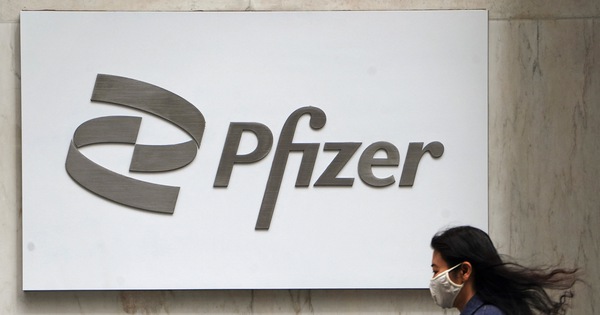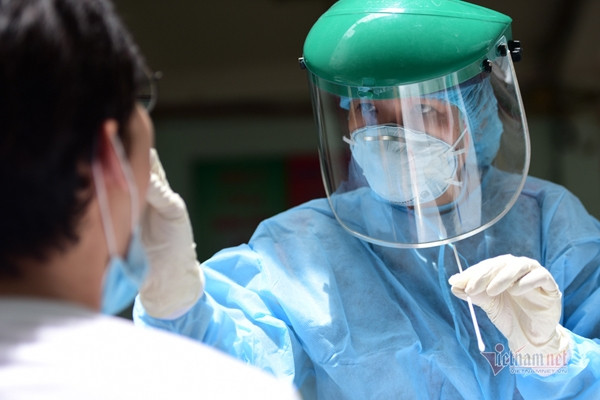AmericaThe spray Covid-19 vaccines can block the virus as soon as they penetrate the nasal mucosa, effectively protecting users against the risk of infection.
The Omicron variant circulating around the world has different properties from previous versions of nCoV. It is most contagious, especially through the upper respiratory tract, from one person’s nose to another’s nose. The number of infections has skyrocketed since this winter, even among vaccinated people.
Since then, scientists have rethought the most effective strategy to prevent future mutations. They aim for a vaccine that is more protective, completely preventing the infection in the first place. Their hopes are in the nasal spray vaccine.
The initial Covid-19 vaccine was quite effective, preventing patients from becoming seriously ill and dying. As countries start to get booster shots, experts say booster doses will only have limited benefit in healthy people. Converting vaccines from injections to sprays can create immunity right where the virus enters, preventing the spread of the virus in the first place.
The immunology of the spray vaccine is quite complex, but the idea behind it is simple. A spray containing the vaccine into the nostrils can stimulate “mucosal” immunity – the antiviral component in the tissue lining the airways. Local protection can prevent infection and prevent new strains.
In fact, Omicron changed opinion about vaccines. During the first year of deployment, the vaccine saved millions of lives, preventing infection even in the context of mutations like Delta, Alpha circulating. Omicron becomes a challenge even in countries with high vaccination rates. Scientists’ hopes soon turned to fear.
At this point, many experts think of spray vaccines. Some say it’s too early to look forward to the progress of this product’s development. Many people believe that the main goal of vaccination is to protect people from severe disease, not to prevent all mild infections. Advocates of aerosol vaccines also acknowledge that administration and distribution can be complicated.
However, the idea is still gaining traction. Akiko Iwasaki, an immunologist at Yale University School of Medicine, is working on a spray vaccine to prepare for the next pandemic. The Omicron mutation changed her mind.
“Realizing that the new strain has the ability to spread quickly, making vaccines no longer effective in preventing infection, I think I have an opportunity to contribute something to this pandemic,” Iwasaki said.

Testing the spray Covid-19 vaccine at CyanVac. Image: NY Times
President Joe Biden’s National Covid-19 Preparedness Plan, announced in March, emphasizes the need to adjust vaccines to match strains within 100 days of their appearance.
A growing number of scientists believe that a vaccine to prevent initial infection is just as urgent. Experts at the National Institutes of Health as well as the Biomedical Advanced Research and Development Authority (BARDA) consider the “next generation vaccine”. Among them, there is a vaccine that stimulates mucosal immunity, which can prevent transmission.
“We were able to launch Operation Speed for aerosol vaccines, but we don’t have the experience,” said Karin Bok, director of the Centers for Disease Prevention and Emergency Response at the National Institute of Allergy and Infectious Diseases. to do this”.
However, pharmaceutical companies have actively tested new generation vaccines. Dan Wagner, 33, is one of those who signed up to participate in the trial of the spray vaccine.
As an online business person, he is not worried about being infected with Covid-19 during his work. Wagner has no underlying disease, difficult to get serious if infected with virus. When he was eligible for vaccination, he kept hearing about people who had been vaccinated and still contracted the disease.
“I’m young, have no medical history, always be careful. I’m not too afraid that I will catch the virus. So it makes no sense to get a vaccine that I know in advance does not prevent infection,” he said. speak.
As the Omicron strain spread, Wagner heard about the Cincinnati Children’s Hospital Medical Center trial of a nasal spray vaccine. Vaccines can prevent viral infections in the first place. He signed up for a nasal vaccine trial at the end of January.
Instead of the familiar needle sensation, he could feel the drops of vaccine running down his nose and down his throat. Wagner said it felt strange, but he had no side effects.
The experimental Wagner vaccine, developed by the biotech company CyanVac in Georgia, contains a version of the virus used to vaccinate against kennel cough, which has been added with a spike protein outside of nCoV.
In theory, the virus in dogs would multiply for a limited time in the human nose, training the immune system to recognize the spike protein of Covid-19 and block the pathogen later on. The virus used in the vaccine is harmless to humans.
After the test, Wagner regularly returned to the medical facility to take samples for testing for anti-viral antibodies. The researchers also looked at how long the dog virus took to clear from the body.
Pharmaceutical companies use different technologies to make vaccines. Vaxart, a San Francisco company, is testing a pill vaccine containing a harmless version of the cold virus. The virus cannot replicate, does not cause infection, but still has the viral spike protein and induces an immune response.
In New York, researchers from the Icahn School of Medicine at Mount Sinai have developed a spray vaccine containing the cold and cough virus in chickens, supplemented with the spike protein of nCoV.
The University of Oxford has been testing a spray version of AstraZeneca’s vaccine. In India, Bharat Biotech is working on a similar vaccine.
In fact, the spray vaccine is not new, but it is not yet widespread. The research process encountered obstacles for many years. Scientists have tested FluMist, a flu vaccine that has not been approved for the elderly and young children, which is less effective than the regular vaccination.
Many nasal spray vaccines are based on live or attenuated viruses and should not be used in immunocompromised individuals or pregnant women. Scientists carefully consider their safety, because the nose is so close to the brain.
Martin Moore, executive director of the Meissa Vaccines Development Center, said: “Omicron has changed the opinion of experts. Mutants will continue to appear, but less and less dangerous.”
The spray Covid-19 vaccine is also being used test in Vietnam, in the third phase of volunteer recruitment. This is a Chinese vaccine, phase three trial in Vietnam and some other countries according to world practice on new vaccine research process.
Thuc Linh (According to NY Times)
at Blogtuan.info – Source: vnexpress.net – Read the original article here



